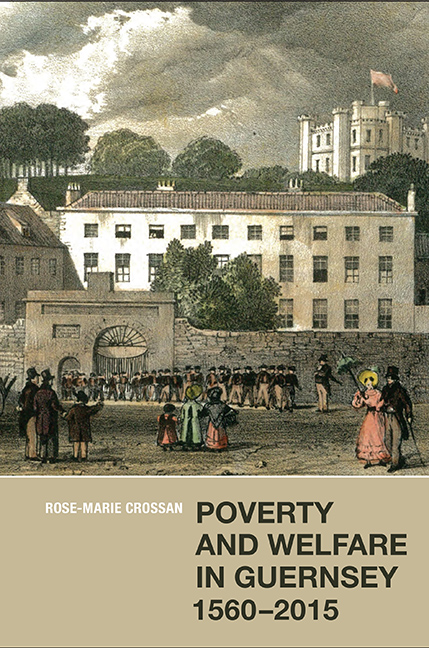Book contents
- Frontmatter
- Dedication
- Contents
- List of Illustrations
- Acknowledgements
- Abbreviations
- Conventions, Note on curren
- Maps
- Introduction
- I Context
- II Welfare
- III Town Hospital
- IV Twentieth Century and Beyond
- Conclusion
- Appendix 1 Writings on Peasant Proprietorship in Guernsey
- Appendix 2 Poor Rates, Indoor and Outdoor Relief Spending, St Peter Port, 1724–1924
- Appendix 3 Parochial Poor Relief in Other Channel Islands
- Appendix 4 Average Year-end Head-counts and Average Annual Admissions and Discharges, Town Hospital, 1700s–1900s
- Appendix 5 Adult Admissions Ascribed to Illness and Accidents, Town Hospital, 1852–1919
- Appendix 6 Relative Proportions of Men and Women in Year-end Head-counts and Annual Admissions, Town Hospital, 1750–1919
- Appendix 7 Annual Averages of Child Admissions and Year-end Numbers, Town Hospital, 1756–1919
- Appendix 8 Over-60s as a Proportion of all Inmates, and Composition by Sex of Over-60s Cohort, Town Hospital, 1756–1911
- Appendix 9 Average Weekly Amounts Purchased per Head, Town Hospital, 1760–1917
- Appendix 10 Timeline: Developments in Poor Relief and Social Security, 1700–2010
- Bibliography
- Index
1 - Governance, Economy, Society
Published online by Cambridge University Press: 18 June 2021
- Frontmatter
- Dedication
- Contents
- List of Illustrations
- Acknowledgements
- Abbreviations
- Conventions, Note on curren
- Maps
- Introduction
- I Context
- II Welfare
- III Town Hospital
- IV Twentieth Century and Beyond
- Conclusion
- Appendix 1 Writings on Peasant Proprietorship in Guernsey
- Appendix 2 Poor Rates, Indoor and Outdoor Relief Spending, St Peter Port, 1724–1924
- Appendix 3 Parochial Poor Relief in Other Channel Islands
- Appendix 4 Average Year-end Head-counts and Average Annual Admissions and Discharges, Town Hospital, 1700s–1900s
- Appendix 5 Adult Admissions Ascribed to Illness and Accidents, Town Hospital, 1852–1919
- Appendix 6 Relative Proportions of Men and Women in Year-end Head-counts and Annual Admissions, Town Hospital, 1750–1919
- Appendix 7 Annual Averages of Child Admissions and Year-end Numbers, Town Hospital, 1756–1919
- Appendix 8 Over-60s as a Proportion of all Inmates, and Composition by Sex of Over-60s Cohort, Town Hospital, 1756–1911
- Appendix 9 Average Weekly Amounts Purchased per Head, Town Hospital, 1760–1917
- Appendix 10 Timeline: Developments in Poor Relief and Social Security, 1700–2010
- Bibliography
- Index
Summary
Governance
Until the thirteenth century, the Channel Islands shared a common history with north-west France. It is thought that they became part of the Roman Empire at the same time as Gaul, and were inhabited after the fall of the Empire by a Gallo-Roman population under the Frankish monarchy. In the 900s, the Islands and adjacent Cotentin peninsula were absorbed into the territory of the Dukes of Normandy. Duke William's conquest of England in 1066 brought no change to the Islands, which continued to be governed as part of Normandy as before. In 1204, however, the Islands were politically severed from the Norman mainland when John, king of England and duke of Normandy, lost the continental portion of his duchy to the French king. The Islands gained strategic value as stepping-stones between England and John's remaining continental possessions, and he and his successors contrived by various means to secure their allegiance. An important way in which insular sympathy was won lay in the decision of post-1204 monarchs to respect the Islands’ existing law and institutions, and to allow them to govern themselves, under royal supervision.
After a period of instability, the Islands were recognised by the 1259 Treaty of Paris as part of Henry III of England's continental territories. Five years previously, Henry had granted them to his son, the future Edward I, ‘in such manner that the said lands … may never be separated from the Crown’. The Islands thereafter remained possessions of the English Crown but were never incorporated into the Kingdom of England (nor, later, into the United Kingdom). Subsequent monarchs issued charters guaranteeing Islanders’ customs and privileges, and granting them further privileges. Among these were autonomy in tax matters, freedom of trade with England, immunity from the jurisdiction of English courts, and exemption from military service outside the Islands.
By the late 1200s, the local administrations of Jersey and Guernsey were each headed by a Bailiff with ultimate responsibility for the administration of justice in the king's court. These acted under a joint Warden appointed by the English king to uphold the wider interests of the Crown. The two Bailiwicks in time embarked on divergent courses. By 1469, Edward IV had granted each a separate charter of its own. By 1478, each Bailiwick had its own Warden. The Bailiwicks eventually became completely sundered, and their political, legal and administrative structures assumed different, though related, forms.
- Type
- Chapter
- Information
- Poverty and Welfare in Guernsey, 1560-2015 , pp. 7 - 22Publisher: Boydell & BrewerPrint publication year: 2015



